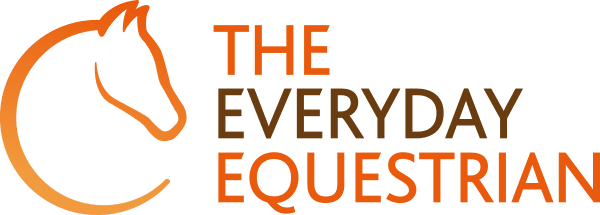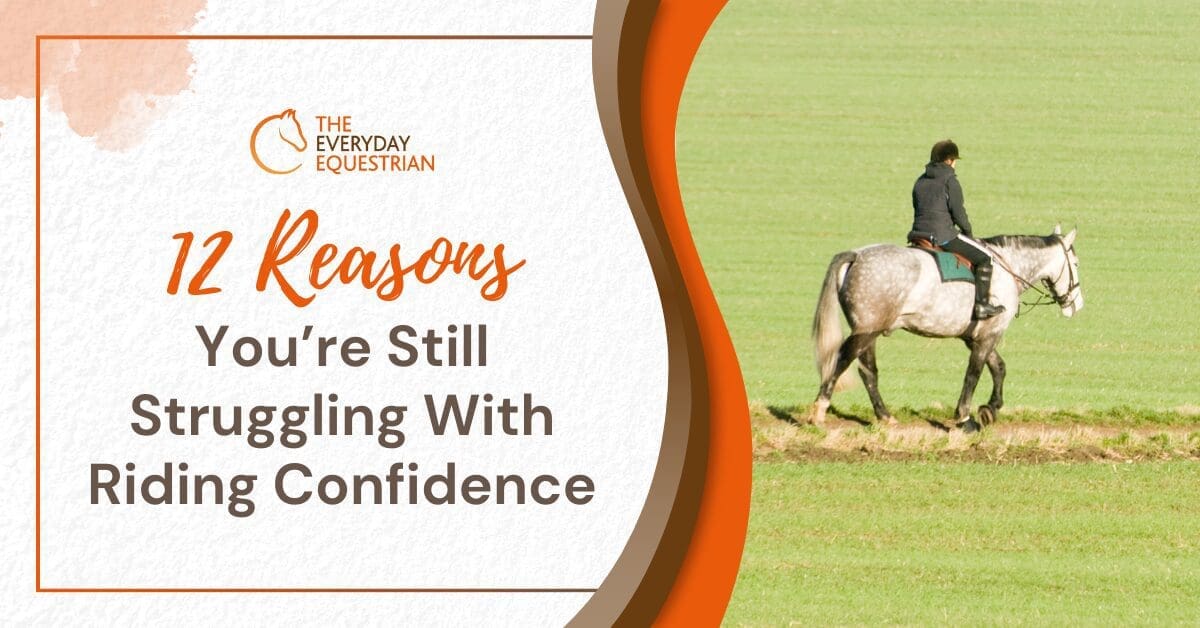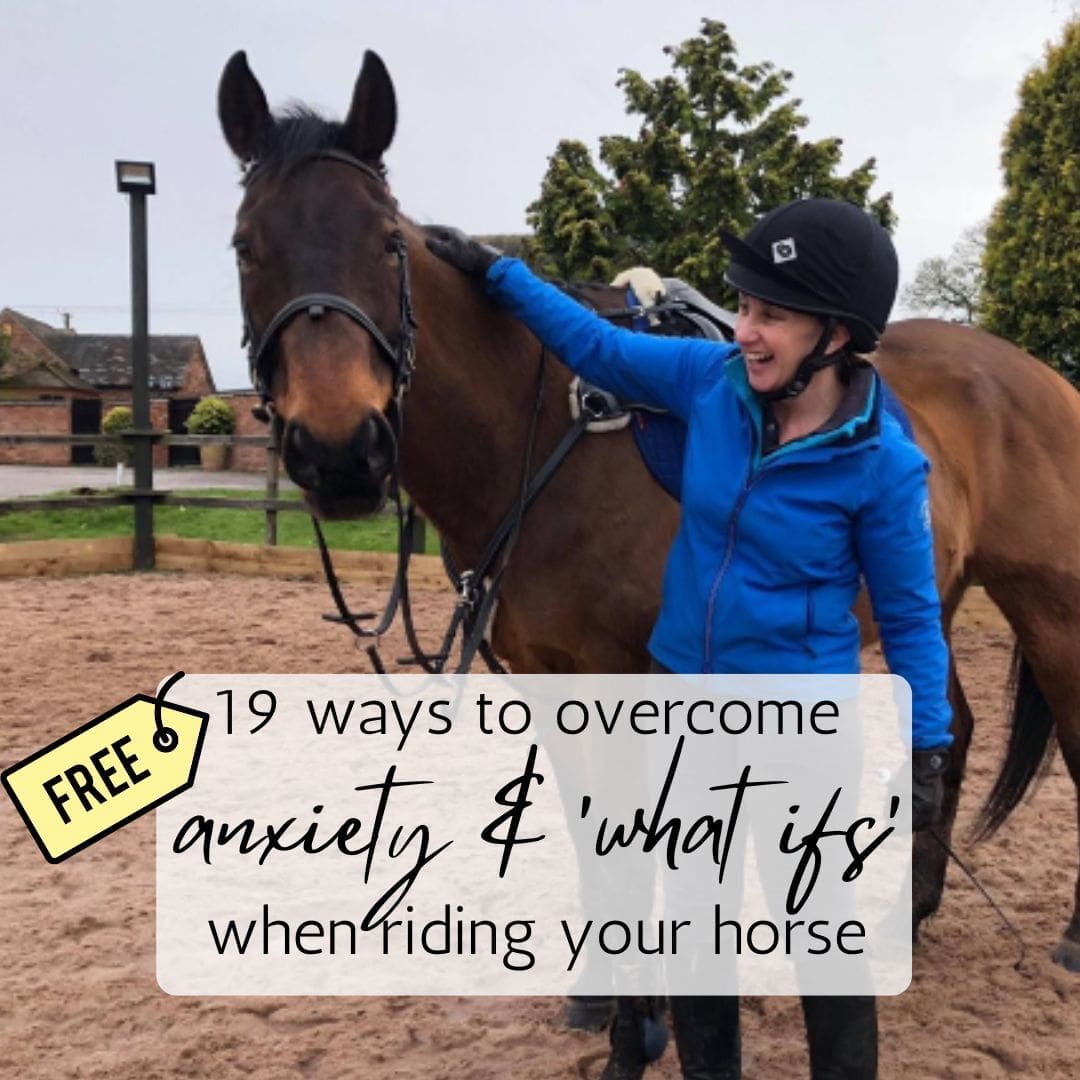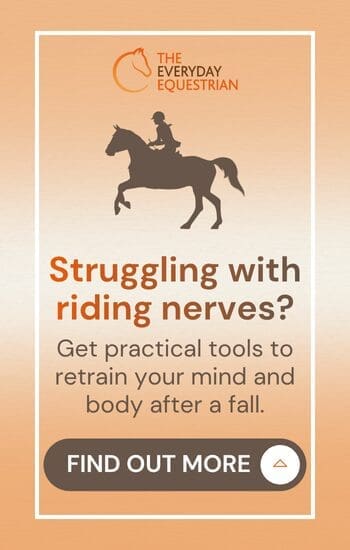If you’ve ever wished you could ride more confidently, you’re definitely not alone. So many riders feel held back by nerves, fear, or anxiety.
You might look around and think that confident riders were just born that way, but the truth is, confidence is something you build. It’s not a gift or a lucky trait. It comes from consistent effort, mindset shifts, and learning how to work with your thoughts instead of against them.
The problem is, sometimes we unintentionally get in our own way. There are often hidden blocks that stop us from making progress. Until we shine a light on them, we stay stuck.
In this article, we’ll look at 11 common reasons you might not yet be ready to become a confident rider. These aren’t meant to criticise, but to raise awareness. Once you spot the patterns, you can start making changes that actually move you forward.
So let’s dive in and see which of these might be holding you back.
1. You’re Hoping for a Quick Fix
It’s completely understandable to want things to change fast. When riding starts to feel stressful or scary, you naturally want the fear to go away — and quickly. You might find yourself searching for hacks, tips, or ‘magic’ confidence tools that promise to fix everything overnight.
But here’s the truth that most riders don’t want to hear: there is no quick fix for confidence.
Real, lasting confidence doesn’t come from one good ride, a lucky lesson, or even the perfect horse. It comes from consistent action over time, especially on the days when things don’t go perfectly. It’s built ride by ride, thought by thought, and through the decisions you make when you feel nervous but ride anyway.
The idea of a shortcut is tempting, especially if you’ve been struggling for a while. But if you’re always looking for an instant result, you might miss the deeper work that leads to real transformation.
If you’ve caught yourself thinking, “Why am I still like this?” or “Why isn’t this working yet?”, that’s a sign your expectations might be too short-term. Try asking instead, “What small step can I take today that my future self will thank me for?”
2. You’ve Started Believing the ‘Nervous Rider’ Label
At first, calling yourself a “nervous rider” might feel like a way to explain how you’re feeling. It gives people a quick summary, and maybe even helps you feel seen. But over time, this label can start to define you.
When you tell yourself (and others) “I’m just a nervous rider,” it becomes part of your identity. And once something becomes part of who you think you are, it’s much harder to change. You stop challenging it. You start making choices based on fear instead of possibility. You stay stuck.
The truth is, feeling nervous doesn’t make you a nervous rider for life. It just means you’re having a very normal emotional response to something that feels important, uncertain, or a little scary.
What would happen if you shifted the label? Instead of “I’m a nervous rider,” try saying “I’m a rider who’s working on my confidence.” This small change opens the door to growth and possibility. It reminds you that confidence is something you can build, not something you either have or don’t have.
Your identity is powerful. Choose one that supports the rider you want to become.
3. You’re Avoiding Responsibility for Your Progress
This one can be uncomfortable to admit — but it’s also a game-changer when you recognise it.
When you feel stuck or scared, it’s easy to start blaming external things: the wrong horse, a bad experience, an unsupportive instructor, or even the weather. And while those things can have an impact, they aren’t the full story.
At some point, you have to decide that your progress is your responsibility.
That doesn’t mean it’s your fault you feel anxious. It doesn’t mean you have to figure it all out alone. It simply means that confidence won’t magically land in your lap — you have to choose to work on it, step by step.
Taking responsibility puts you back in control. It’s the moment where things start to shift from, “Why is this happening to me?” to “What can I do with what I’ve got?”
This mindset switch is powerful. You stop waiting for the perfect moment, the perfect horse, or the perfect ride — and you start creating the conditions for progress from where you are, right now.
4. You’re Dodging Discomfort
No one enjoys feeling uncomfortable. It’s natural to want to avoid the things that make your heart race, your stomach churn, or your legs feel like jelly in the saddle. But here’s the tricky part: confidence and discomfort go hand in hand.
You can’t grow your confidence without getting a little uncomfortable along the way.
That doesn’t mean you have to throw yourself into terrifying situations. In fact, that usually backfires. But it does mean gently stretching your comfort zone — bit by bit — rather than staying safely inside it.
If you always avoid the hacks you find tricky, the exercises that make you tense up, or the situations where you might feel exposed, your confidence won’t grow. It can’t. Because confidence is built by proving to yourself that you can handle more than your fear wants you to believe.
Ask yourself: what’s one small thing I’ve been avoiding because it feels uncomfortable? What would it look like to try it with support, or in a lower-pressure way?
Discomfort isn’t a sign you’re doing something wrong. Often, it’s a sign you’re stepping towards growth.
5. You’re Closed Off to New Ideas
When you’ve tried lots of things and still feel stuck, it’s easy to slip into a mindset of “this just won’t work for me.” You start to feel disheartened, maybe even a bit cynical. And without realising it, you close the door on ideas or approaches that might actually help.
Sometimes, it’s not that the tools don’t work; we’re not open to trying them properly.
Confidence work often involves stepping outside of your usual way of thinking. That might mean exploring mindset coaching, trying new riding strategies, or being open to practices that feel unfamiliar at first. If your first instinct is to shut something down with, “That won’t help,” or “I’m not the sort of person who does that,” you might be blocking your own progress.
Being open doesn’t mean you have to agree with everything. It just means you’re willing to try, to be curious, and to explore with an open mind.
You don’t have to believe in everything straight away. But give it enough of a chance to see whether it could shift something for you. Because the solution you’ve been waiting for might be the one you’ve been resisting.
6. Your Beliefs Are Holding You Back
What you believe shapes everything — how you ride, how you respond under pressure, and how you see yourself as a rider.
If deep down you believe things like “I’ll never be confident,” or “I’m too old to improve now,” or “I always mess things up,” then that belief will quietly steer your actions and limit your progress. It’s like trying to move forward with the handbrake on.
These thoughts can feel so true, especially if you’ve had difficult experiences in the past. But here’s the thing: beliefs are not facts. They’re just thoughts you’ve repeated often enough that your brain has accepted them as truth.
The good news? Beliefs can be changed.
It starts by noticing the ones that come up when you’re riding. Do they sound encouraging or critical? Do they help you move forward, or keep you stuck?
Try challenging those thoughts gently. Instead of “I’ll never be confident,” ask “What if I could become more confident over time?” That tiny shift opens the door to growth.
The stories you tell yourself matter. Choose ones that support the rider you’re becoming.
7. You’ve Lost Faith That Anything Will Work
When you’ve tried a lot of things and nothing seems to help, it’s completely understandable to feel stuck. You start thinking, “Maybe I’m just not meant to be a confident rider.” Or, “What’s the point in trying something else when nothing ever changes?”
This kind of thinking is often a form of self-protection. If you stop hoping, you can’t be disappointed — right? But in trying to protect yourself from that disappointment, you also shut yourself off from potential progress.
Here’s the hard truth: if you don’t believe anything will work, you won’t fully commit to anything. You’ll keep one foot in and one foot out, just in case it fails again. And when you do that, you’re never giving anything a real chance to help.
What if the next thing you try does work — but only if you go all in?
Having faith doesn’t mean blind optimism. It just means keeping a little space open in your mind for the possibility that things can improve — even if the path looks different than you imagined.
You don’t have to feel 100% hopeful all the time. But try to hold on to a tiny bit of belief that change is possible. That belief is the starting point for everything.
8. You’re Half In, Half Out
You say you want to feel more confident. You might even be doing some of the right things — reading, watching videos, or thinking about what needs to change. But if you’re honest, are you really all in?
Or are you dipping a toe in the water, holding back, just in case it doesn’t work?
This is really common, especially if you’ve tried before and felt let down. You might think, “I’ll try, but I’m not going to get my hopes up,” or “I’ll commit to this… but only if it feels easy.” That mindset is understandable — but it also keeps you stuck.
Confidence builds through consistency, effort, and a willingness to keep going even when it’s uncomfortable. If you’re only giving 50 percent, you’ll only ever get 50 percent of the result — and that just reinforces the belief that “nothing ever works.”
Ask yourself: what would it look like to go all in? Not perfectly. Not fearlessly. Just with commitment. What could change if you showed up fully for your own progress?
You don’t have to be fearless to be all in. You just have to be willing.
9. You’re Trapped in a Fixed Mindset
Do you ever catch yourself thinking, “I’m just not naturally confident,” or “I’ve always been like this”? That’s a sign of a fixed mindset — the belief that your abilities and traits are set in stone and can’t really change.
This mindset quietly shuts down progress before it even starts.
In contrast, a growth mindset is the belief that you can develop new skills over time — including confidence. It doesn’t mean ignoring your nerves or pretending everything’s fine. It means recognising that your current struggles are not permanent.
With a fixed mindset, every setback feels like proof that you’re not good enough. But with a growth mindset, setbacks are just part of the process — opportunities to learn, adapt, and try again.
Confidence isn’t something you’re born with. It’s something you build. Every confident rider you admire has worked through self-doubt and setbacks. What sets them apart is their willingness to keep going and keep learning.
So, which mindset are you practising most of the time? The one that keeps you where you are, or the one that believes you can grow?
10. You Haven’t Found the Right Kind of Support
If you’ve been trying to build confidence on your own, or with support that doesn’t quite understand what you’re going through, it’s no wonder you’re still feeling stuck.
Not all support is created equal. You might have a well-meaning instructor who focuses mostly on your position or technical riding skills, but who doesn’t know how to help when your mind goes into panic mode. You might have friends who say things like, “Just get on with it” or “You’re overthinking it,” which only makes you feel worse.
The truth is, rider confidence is as much about your psychology as it is about your riding. You need support that understands the mental side of things — someone who can help you work through fear, rebuild trust in yourself, and develop the tools to manage your thoughts and emotions in the saddle.
That kind of support exists, and it can make a huge difference. You don’t have to figure this out alone.
If the help you’ve had so far hasn’t worked, it doesn’t mean you can’t improve. It might just mean you haven’t found the right kind of help yet.
11. You’re Still Chasing Perfection
Many riders believe that if they could just ride perfectly, they wouldn’t feel nervous anymore. No mistakes. No uncertainty. No wobbles. But perfection is an illusion — and chasing it often fuels anxiety rather than easing it.
Perfectionism creates a constant pressure to perform. It makes every small mistake feel like a failure. It turns a slightly tense transition or a spook in the corner into a sign that you’re not good enough. And that pressure can be exhausting.
Confidence doesn’t come from perfection. It comes from trust — in yourself, in your horse, and in your ability to handle whatever comes up.
Letting go of perfection isn’t about lowering your standards. It’s about creating space to learn. To improve. To have the odd off day without it spiralling into self-doubt.
Ask yourself: are you expecting things to be flawless before you’ll allow yourself to feel confident? What might change if you gave yourself permission to ride imperfectly — and still be proud?
The most confident riders are not perfect. They’re just more accepting of the learning process. And that’s what allows them to grow.
12. You’re Comparing Your Journey to Everyone Else’s
It’s easy to fall into the trap of looking around and thinking, “She’s braver than me,” or “They’re progressing so much faster.” Whether it’s scrolling through Instagram or watching others at the yard, comparison can creep in without you even realising.
But comparison rarely leads to confidence. In fact, it often does the opposite — making you feel behind, not good enough, or like you’re failing.
The truth is, no two riders have the same story. You don’t know what someone else has gone through to get where they are. You don’t know their fears, their past experiences, or how many setbacks they’ve had to overcome.
Your journey is yours. And confidence grows when you stay focused on your own path — not someone else’s highlight reel.
Instead of asking, “Why aren’t I where they are?” try asking, “What small step can I take today that moves me forward?” Progress isn’t always fast or flashy — but it’s still progress.
Celebrate what you’re doing, not what you’re not.
Awareness Is the First Step
If you’ve recognised yourself in some of these reasons, you’re not alone — and it doesn’t mean you’re failing. It simply means you’re human.
Every rider faces mindset challenges at some point. Confidence isn’t something you either have or don’t have. It’s something you build, bit by bit, by becoming more aware of the thoughts, habits, and beliefs that are holding you back — and by choosing to do things differently.
The good news? You don’t have to do this on your own.
Inside my Crack the Confidence Code Membership, you’ll find the support, tools, and guidance to help you overcome fear, quiet the self-doubt, and grow real, lasting confidence in the saddle. Whether you’re returning to riding after a break, struggling with nerves, or just want to enjoy your horse more, there’s a place for you here.
You’ve already taken the first step by reading this far. Why not take the next step and join us?
👉 Click here to find out more and join the membership today
Let’s build the confidence you deserve — one ride at a time.



